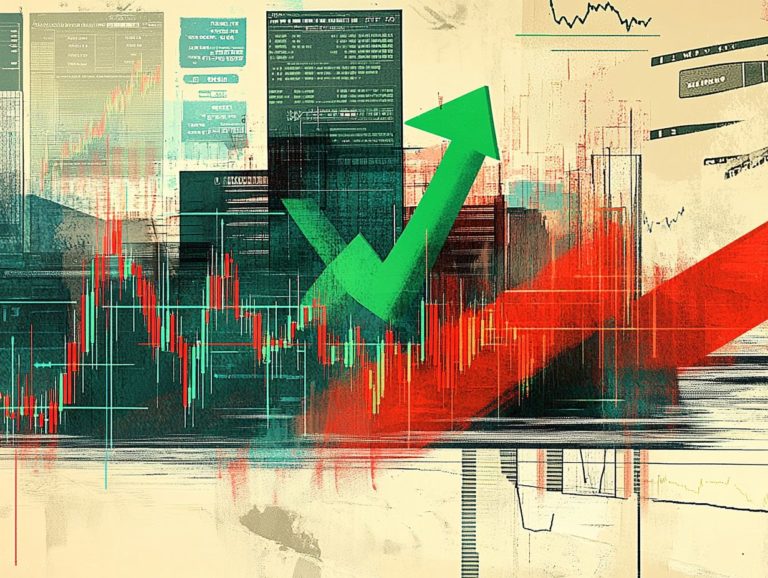How to Stay Calm During Market Volatility?
Market volatility can resemble a thrilling rollercoaster ride, with sharp ups and downs that may unsettle even the most experienced investors. Grasping what drives these fluctuations is essential for navigating the financial landscape with unwavering confidence. Emotions can easily cloud judgment, prompting hasty decisions that jeopardize your long-term objectives.
Let s explore effective strategies that will help you stay calm during turbulent times, recognize when it s wise to seek professional guidance, and emphasize the advantages of a calm, calculated approach to investing.
Discover how to stay grounded and make informed choices, even in an unpredictable market.
Contents
- Key Takeaways:
- Understanding Market Volatility
- The Importance of Staying Calm
- Practical Tips for Managing Emotions
- Strategies for Staying Calm During Market Volatility
- Seeking Professional Advice
- Frequently Asked Questions
- What is market volatility?
- Why is it important to stay calm during market volatility?
- How can I stay calm during market volatility?
- What are some tips for managing emotions during market volatility?
- What should I do if I’m feeling anxious about market volatility?
- Is it a good idea to make changes to my investment portfolio during market volatility?
Key Takeaways:

- Understand that market ups and downs are normal they re part of investing!
- Controlling emotions is crucial for making sound investment decisions during market volatility. Stay calm and avoid impulsive choices.
- Implement practical tips like diversifying your portfolio and focusing on long-term investment strategies to help manage emotions and navigate market volatility.
Understanding Market Volatility
Understanding market volatility is essential for you as an investor striving to meet your financial goals. This volatility reflects significant fluctuations in the prices of stocks and bonds within the stock market.
Various economic indicators (like inflation, which means rising prices, and GDP, or gross domestic product, indicating economic performance) and global issues contribute to this unpredictability. Staying informed and ready to navigate potential downturns is crucial.
Factors such as interest rates and global crises like the ongoing tensions between Russia and Ukraine can profoundly influence market fluctuations and investor sentiment. This, in turn, affects your long-term returns and shapes your strategies for cash savings and diversified portfolios.
What Causes Market Volatility?
Market volatility is influenced by various factors, including economic indicators such as inflation, GDP growth, and consumer sentiment. Together, these elements paint a picture of the economy’s overall health.
External elements like natural disasters and geopolitical events can add to these fluctuations, sending ripples through investor confidence and market forecasts. For example, a major natural disaster can disrupt supply chains, leaving investors in a state of heightened uncertainty.
Geopolitical tensions such as the ongoing Russia-Ukraine conflict often trigger significant shifts in market sentiment, compelling investors to respond rapidly to perceived risks. These events can lead to increased market sell-offs or sudden surges, reflecting the collective anxiety or optimism of investors as they navigate these unpredictable waters.
The Importance of Staying Calm
Remaining composed during periods of market volatility is vital for honing a successful investment strategy. Emotional decision-making can easily lead to impulsive actions that compromise your long-term financial planning and risk tolerance.
It’s tempting to react instinctively to market fluctuations and downturns, but such responses can jeopardize your carefully laid investment plans. By grasping the psychology behind emotional reactions to market conditions, you can cultivate a more rational investment approach.
This ensures your decisions align with your individual risk profile and financial objectives.
In conclusion, maintaining composure during market volatility is crucial for achieving your financial goals. Embrace these insights and strategies to foster a calm, informed approach to your investments!
How Emotions Affect Investment Decisions

Emotional decision-making significantly influences your investment choices. It often causes you to react irrationally during periods of market volatility.
Consider the 2008 financial crisis. Many individuals sold off their assets in a panic, driven by the fear of losing everything. This ultimately led to substantial financial losses.
This instinct to flee can easily overshadow rational analysis, prompting you to abandon sound risk tolerance strategies.
On the flip side, during the dot-com bubble, greed-driven behavior saw countless investors pouring money into overvalued stocks while ignoring critical warning signs.
This dynamic interplay between fear and greed illustrates how emotions can shape your decision-making processes, often leading to regrettable outcomes.
When you understand how emotions drive your decisions, you can take control and thrive in any market!
By recognizing these psychological influences, you can navigate turbulent markets more effectively and make informed choices that align with your investment goals.
Practical Tips for Managing Emotions
Managing your emotions is key to crafting an effective investment strategy, especially when market volatility is at its peak. Following practical tips can help you maintain clarity amid chaos.
Establish clear financial goals that resonate with your long-term aspirations. This clarity allows you to maintain focus when the markets are in disarray.
Regularly reviewing your portfolio is essential. By keeping an eye on performance and adjusting allocations as necessary, you position yourself to make informed decisions rather than succumbing to impulsive reactions.
Consulting with a financial advisor can offer invaluable guidance, helping you strike a balance between cash reserves and diverse investment opportunities.
This disciplined framework not only nurtures emotional resilience but also paves a sustainable path toward financial growth.
Strategies for Staying Calm During Market Volatility
Developing effective strategies to maintain your composure during market volatility is essential for you as an investor aiming for long-term returns.
By embracing a disciplined investment strategy that emphasizes a diversified portfolio and the significance of emergency funds, you can mitigate the emotional toll of market fluctuations.
These approaches not only serve as a safety net during downturns but also protect you from the urge to make impulsive decisions that could undermine your financial goals.
Aligning your investments with your risk tolerance and overall financial plan allows you to navigate the turbulent waters of investing with confidence and clarity.
Long-Term Investment Strategies
Adopting long-term investment strategies is crucial for you to achieve sustainable financial goals, especially in a market that frequently tests the patience of even the most seasoned investors with its volatility.
Consider investing the same amount of money regularly, regardless of market ups and downs. This method helps mitigate the impact of market fluctuations on your overall portfolio.
Focusing on a mix of equities (stocks in companies) and bonds (loans to governments or corporations) provides a balanced approach, with equities offering the potential for growth and bonds contributing stability.
The importance of a diversified portfolio cannot be overstated; it spreads risk across various asset classes and sectors, acting as a buffer against market downturns.
By integrating these strategies, you not only safeguard your capital but also significantly enhance your chances of achieving consistent returns over time.
Seeking Professional Advice

Seeking advice from a financial advisor can be an invaluable resource for you as you navigate the complexities of the stock market, particularly during turbulent times.
A seasoned financial advisor can offer tailored investment strategies that take into account your unique risk tolerance and financial goals, ensuring that your approach aligns with your long-term aspirations.
Having a professional by your side can assist in establishing effective cash reserves, allowing you to remain calm and focused on your objectives, even when external market pressures arise.
Act now to safeguard your investments and ensure a brighter financial future! Start today by reviewing your investment strategy and consult a financial advisor to align your goals!
When to Consult a Financial Advisor
Knowing when to consult a financial advisor is essential for you as an investor. This is particularly true during significant market volatility, which can test your investment strategies (the plans you create to reach your financial goals) and risk tolerance (your ability to handle market ups and downs).
For example, as you approach retirement, the complexities of shifting from growing your savings to keeping your savings safe often warrant expert guidance. This ensures your financial stability in later years. Major market downturns can also cloud your judgment, making it difficult to make rational decisions.
Engaging an experienced advisor in these situations can supercharge your decision-making and strategic planning. They offer valuable insights and personalized advice to help you navigate turbulent waters. By leveraging their expertise, you can develop tailored strategies that align with your long-term goals while effectively managing risks.
The Benefits of Staying Calm During Market Volatility
Staying calm during market volatility brings numerous benefits that can significantly enhance your chances of achieving financial goals.
By cultivating a composed mindset, you elevate your decision-making abilities, enabling you to make more rational and strategic investment choices. This tranquility helps you avoid the emotional pitfalls that often lead to hasty sell-offs or impulsive buying.
With a clear head, you become better equipped to focus on your long-term strategies, understanding that short-term fluctuations are a normal part of the broader market cycle. Ultimately, maintaining this composure fosters greater confidence as you navigate uncertain waters, paving the way for sustained financial growth and security.
Frequently Asked Questions
What is market volatility?

Market volatility refers to the rate at which stock prices fluctuate in a market. It is often associated with uncertainty and fear, which can lead to large swings in the market.
Why is it important to stay calm during market volatility?
Staying calm during market volatility is important because it allows you to make rational decisions instead of emotional ones. It helps prevent panic selling and impulsive decisions that can negatively impact your investments.
How can I stay calm during market volatility?
One effective way to stay calm is to have a long-term investment strategy in place and stick to it. Regularly remind yourself of your goals and avoid reacting to short-term market fluctuations.
What are some tips for managing emotions during market volatility?
Some tips for managing emotions include taking breaks from checking your investments constantly, focusing on long-term objectives, and seeking support from a financial advisor or a trusted friend.
What should I do if I’m feeling anxious about market volatility?
If you’re feeling anxious, take a step back and assess your investments objectively. Consider seeking advice from a financial professional and remind yourself that market fluctuations are a normal part of investing.
Is it a good idea to make changes to my investment portfolio during market volatility?
It is generally not recommended to make changes to your portfolio during volatility unless it aligns with your long-term strategy. Attempting to time the market can be risky and may result in missing out on potential gains. Consult with a financial advisor before making any changes.
Ready to take control of your finances? Reach out to a financial advisor today!






